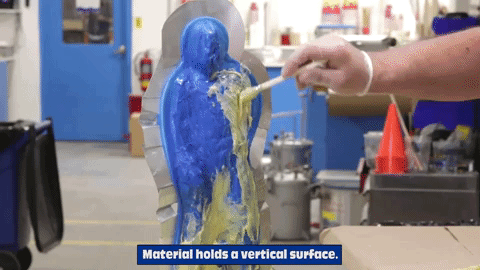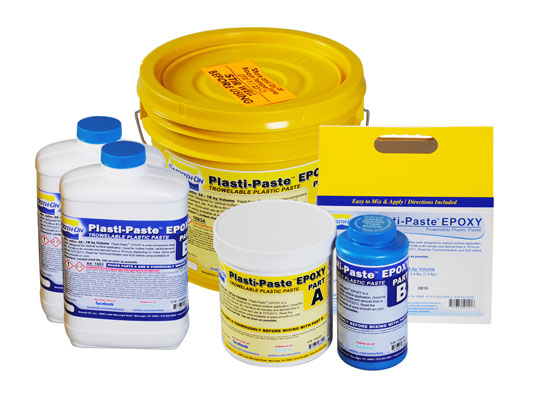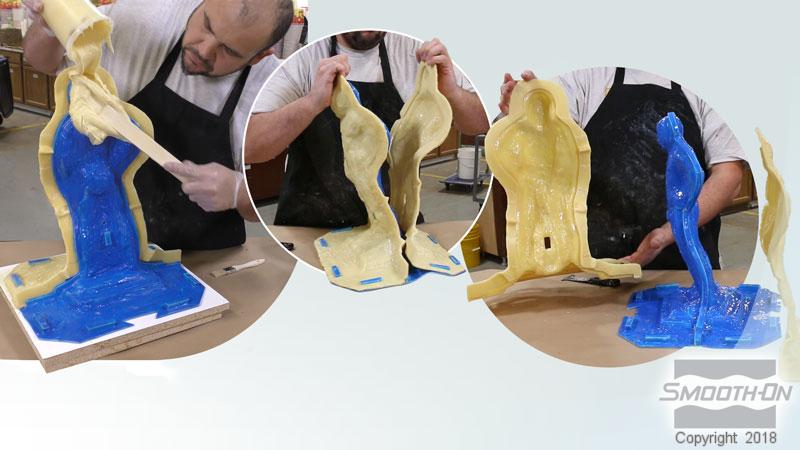Plasti-Paste™ EPOXY
Plasti-Paste™ EPOXY is an epoxy-based version of Smooth-On’s popular urethane Plasti-Paste™ products. It is a two component, fiber-filled epoxy designed for vertical surface application. Part A is a paste and Part B is a liquid. Mix ratio is 2A: 1B by volume or weight. Pot life is 40 minutes and cure time is 16 hours at room temperature depending on mass. Applying heat can reduce cure time. Mixed material holds a vertical surface without sagging and cures very rigid and strong.
Liquid material can be colored with UVO™ colorants and cured epoxy can be sanded, machined and painted with acrylic enamel paints. This plastic can used as a support shell or mother mold material to reinforce rubber molds during casting. It can also be used for creating themed environments, creating art or special effects. This epoxy is also a powerful adhesive and can be used as a repair material for a variety of industrial applications.
Features
Plasti-Paste™ EPOXY offers some advantages over urethane Plasti-Paste™ products:
- Material is not affected by moisture.
- Material has a longer working time for applying over large areas.
- Cured material is more rigid with less being required for making support shells/mother molds.
- Higher heat resistance up (160°F / 71°C).
Instructions
Preparation – Materials should be stored and used in at room temperature (73°F / 23°C). This product has a limited shelf life and should be used as soon as possible. Mixing should be done in a well-ventilated area. Wearing a NIOSH approved resiprator is recommended. Wear safety glasses, long sleeves and rubber gloves to minimize contamination risk. If making a 2 or more piece mother mold, apply appropriate shim apparatus to rubber mold exterior. Because no two applications are quite the same, a small test application to determine suitability for your project is recommended if performance of this material is in question.
Applying A Release Agent – This product is adhesive and will bond to many surfaces. A sealer followed by a release agent is necessary to facilitate demolding when applying as a mother mold over a cured mold rubber. Use Sonite™ Wax followed by a coating of Ease Release™ 200 release agent. A liberal coat of release agent should be applied onto all surfaces that will contact the plastic. You can also apply aluminum foil as a barrier over the surface followed by an application of release agent.
PRE-MIX Part A Before You Start – Part A is a thick paste containing oil that needs to be pre-mixed before being dispensed into measuring container. Dig deep to re-disperse oil & paste components that may have separated.
Measuring – The components of Plasti-Paste™ EPOXY require two different sized containers. The first will be used for measuring out amounts of Part A and Part B. The second should be large enough to contain both components and allow thorough mixing.
Mixing – Mix Ratio is 2A:1B by weight or volume. (Step 1) Fill measuring container to the top with Part A paste, making sure to eliminate any air voids. Level off the top of the container and remove any excess material. The paste should then be thoroughly emptied into a larger container that will act as your mixing container. Repeat as necessary. (Step 2) Fill the measuring container to the top with Part B liquid and empty into mixing container. Mix thoroughly for 2-3 minutes making sure that you scrape the sides and bottom of the mixing container several times. Eliminate color streaks. If adding colorants, pre-mix color with the Part A before adding Part B.
Mixing Large Batches - A ‘Turbine’ mechanical mixer attached to a power drill will make mixing large batches of material much easier. Visit smooth-on.com to learn more about these inexpensive mixers. If mixing large amounts at a time, you can extend pot life by transferring mixed material into a flat container and spreading it out to reduce concentrated mass.
Applying – Apply uniformly with spatula over mold surface. Material will adhere to itself if additional layers are needed. Apply at least 1/4” (0.64 cm) thickness, making sure rubber mold is thoroughly covered. For maximum strength and heat resistance, 3/8” (1 cm) thickness is recommended. Large molds may require added thickness for support shell stability. Supports (wood or metal) may be embedded for added stability and handling. Prevent a jagged surface; Final layer of Plasti-Paste™ EPOXY can be smoothed by wiping solvent (denatured alcohol or acetone) onto surface with a gloved hand.
Making A Two Piece Shell – Plasti-Paste™ EPOXY will bond to most surfaces and itself tenaciously. A barrier coat of paste wax followed by Ease Release™ 200 Mold Release applied to all surfaces is necessary to prevent adhesion. Applying aluminum foil to the contours of all surfaces followed by Ease Release™ 200 Mold Release will also prevent adhesion.
Curing – Material will develop handling strength and can be handled in about 16 hours depending on mass. At this point, it is stable enough to demold, reassemble over rubber mold and make a casting (hold 2 or more piece assemblies together with elastic bands, mold straps or bolts). Large sections should be bolted together to minimize distortion. Full strength develops in 24 hours.
Heat Resistance – Fully cured Plasti-Paste™ EPOXY with a minimum thickness of 3/8” (1 cm) will resist temperatures up to 170°F / 76°C.
If machining or sanding cured epoxy, wear NIOSH approved mask to prevent inhalation of residual particles.
Painting – Make sure surface is clean and free of release agents or other contaminants. Cured plastic can be painted and/or primed and then painted with acrylic enamel paints. Let paint fully dry before putting part into service.
Storage – For best storage results, cast into rubber mold with a gypsum plaster or other dimensionally stable material, assemble mold inside the Plasti-Paste™ EPOXY support shell and store assembled molds on a level surface indoors at room temperature in a dry place.
Related Categories: Epoxy Casting and Laminating Resins
Related Series: Plasti-Paste™ EPOXY – Fiber Filled Trowelable Epoxy
How-To Articles

How To Use Plasti-Paste™ EPOXY to Make a Support Shell
How Plasti-Paste™ EPOXY can be used to make a support shell for a brush mold.

